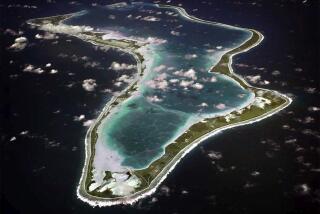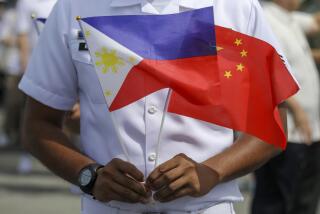Portugal Agrees to Return Macao to China in 1999
BEIJING — China and Portugal reached a settlement Monday under which the tiny but picturesque enclave of Macao, which for centuries served as the hub of early European trade with East Asia, will return to Chinese rule in 1999.
The agreement paves the way for China to move into Macao a little more than two years after it regains control of Hong Kong, the British colony that is now the trading capital of East Asia. Britain agreed two years ago to return Hong Kong to China in 1997.
China apparently intends that the reacquisition of these two European colonies before the end of the century will serve as a symbol of its growing power in Asia and of the advances it has made since its position of weakness at the beginning of this century.
Furthermore, authorities in Beijing hope that by demonstrating that they can take control of Hong Kong and Macao without turmoil, they can eventually help persuade Taiwan to enter into talks about reunification.
The settlement between Chinese and Portuguese negotiators was announced Monday in a brief communication. “The two sides considered the draft texts of the agreement and reached an identity of views on the contents of the texts,” it said.
The text itself will not be made public until Thursday, but diplomats here have confirmed that it provides for China to take control of Macao on Dec. 20, 1999, under a “one-country, two-systems” approach similar to that provided for Hong Kong.
Can Keep Gambling
Like Hong Kong, Macao will be allowed to preserve its capitalist system for the first 50 years under Chinese rule. China has also said that Macao will be able to keep its gambling tables, which these days provide more than a quarter of the Macao government’s revenues.
Portuguese traders moved into Macao in 1557, and the Chinese officially recognized the settlement six years later when Lisbon sent warships to help authorities in Guangdong province combat pirates. The process was far more peaceful than the British acquisition of Hong Kong in 1842, which resulted from a war over British opium trade in China.
As a young revolutionary leader half a century ago, Mao Tse-tung, surveying the extensive European exploitation of China, wrote bitterly that “even a miserable little country like Portugal took Macao from us.”
Yet after the end of the Chinese Civil War in 1949, the new Communist regime was content for many years to leave Hong Kong and Macao alone, using them for financial advantage and for trade and contact with the West.
1974 Offer Rejected
In fact, in 1974, Portugal, then in the midst of giving up its African colonies, volunteered to return Macao to China. The Chinese politely turned down the offer.
During the 1970s, the Portuguese also renounced sovereignty over Macao and conceded that Macao was Chinese territory “under Portuguese administration.”
Two years ago, shortly after signing the agreement with Britain over Hong Kong, China announced it wanted to begin talks over the future of Macao, thus effectively indicating for the first time its willingness to assume control of the territory.
During the negotiations, the Portuguese at first sought to remain in Macao until the year 2007, which would have been the 450th anniversary of the first Portuguese settlement there.
By keeping control of Macao for a full decade after the British left Hong Kong, Portugal might have profited from a surge of investment in Macao by businessmen anxious to take capital out of Hong Kong. But the Chinese refused to accept a 2007 changeover date, and the two sides finally agreed on Dec. 20, 1999.
About 450,000 people live in Macao, 98% of them ethnic Chinese. An estimated 100,000 of them have Portuguese nationality and passports. The main stumbling block in the negotiations was the question of what will happen to these people under Chinese rule. China does not recognize dual nationality and wanted the 100,000 to become Chinese nationals.
According to Beijing-based diplomats, the solution reached was similar to the one in the Hong Kong agreement. The ethnic Chinese now holding Portuguese passports will be given special travel documents by the Portuguese government after 1999.
But they will not generally be able to pass these documents or Portuguese citizenship on to their children. The succeeding generation of these ethnic Chinese will be considered Chinese nationals.
Unusual Threat
At one point during the negotiations, sources said, Portuguese negotiators made an unusual threat: They suggested that if China did not respect Portugal’s wishes, Portugal would leave Macao as soon as possible.
A sudden and disorderly transition in Macao could have touched off the flight of people and capital from Hong Kong, which is located only 40 miles away from the Portuguese territory.
The Nationalist government in Taiwan refuses to recognize the Hong Kong agreement because Britain negotiated with the Communist government in Beijing rather than with Taipei. On Monday, a spokesman for the Foreign Ministry in Taiwan said the agreement on Macao was “invalid” because the Nationalists were the “sole legitimate negotiator” in talks over Macao’s future.”
More to Read
Sign up for Essential California
The most important California stories and recommendations in your inbox every morning.
You may occasionally receive promotional content from the Los Angeles Times.










